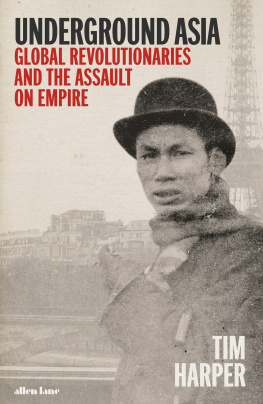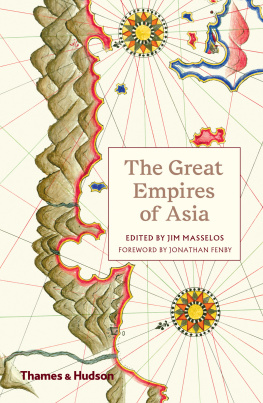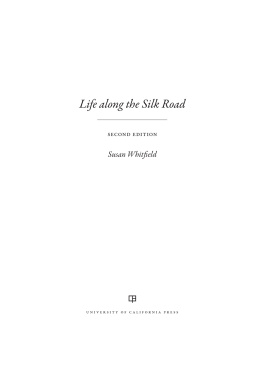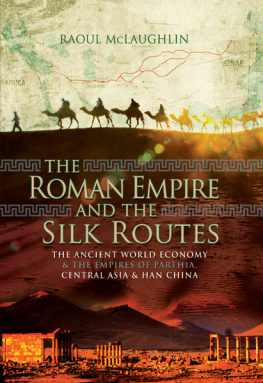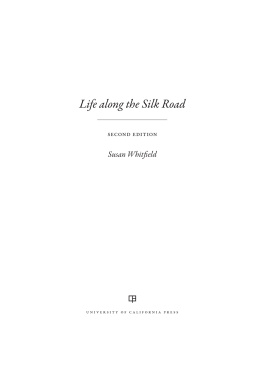AUTHORS IMPRINT
Dedicated to discovering and sharing knowledge and creative vision, authors and scholars have endowed this imprint to perpetuate scholarship of the highest caliber.
Scholarship is to be created... by awakening a pure interest in knowledge.
Ralph Waldo Emerson
The publisher gratefully acknowledges the generous support of the Authors Imprint Endowment Fund of the University of California Press Foundation, which was established to support exceptional scholarship by first-time authors.
From the Indian Ocean to the Mediterranean
THE CALIFORNIA WORLD HISTORY LIBRARY
Edited by Edmund Burke III, Kenneth Pomeranz, and Patricia Seed
1. The Unending Frontier: Environmental History of the Early Modern World, by John F. Richards
2. Maps of Time: An Introduction to Big History, by David Christian
3. The Graves of Tarim: Genealogy and Mobility across the Indian Ocean, by Engseng Ho
4. Imperial Connections: India in the Indian Ocean Arena, 18601920, by Thomas R. Metcalf
5. Many Middle Passages: Forced Migration and the Making of the Modern World, edited by Emma Christopher, Cassandra Pybus, and Marcus Rediker
6. Domesticating the World: African Consumerism and the Genealogies of Globalization, by Jeremy Prestholdt
7. Servants of the Dynasty: Palace Women in World History, edited by Anne Walthall
8. Island World: A History of Hawaii and the United States, by Gary Y. Okihiro
9. The Environment and World History, edited by Edmund Burke III and Kenneth Pomeranz
10. Pineapple Culture: A History of the Tropical and Temperate Zones, by Gary Y. Okihiro
11. The Pilgrim Art: Cultures of Porcelain in World History, by Robert Finlay
12. The Quest for the Lost Nation: Writing History in Germany and Japan in the American Century, by Sebastian Conrad; translated by Alan Nothnagle
13. The Eastern Mediterranean and the Making of Global Radicalism, 18601914, by Ilham Khuri-Makdisi
14. The Other West: Latin America from Invasion to Globalization, by Marcello Carmagnani
15. Mediterraneans: North Africa and Europe in an Age of Migration, c. 18001900, by Julia A. Clancy-Smith
16. History and the Testimony of Language, by Christopher Ehret
17. From the Indian Ocean to the Mediterranean: The Global Trade Networks of Armenian Merchants from New Julfa, by Sebouh David Aslanian
18. Berenike and the Ancient Maritime Spice Route, by Steven E. Sidebotham
19. The Haj to Utopia: The Ghadar Movement and Its Transnational Connections, 19051930, by Maia Ramnath
From the Indian Ocean
to the Mediterranean
The Global Trade Networks
of Armenian Merchants from New Julfa

Sebouh David Aslanian

University of California Press, one of the most distinguished university presses in the United States, enriches lives around the world by advancing scholarship in the humanities, social sciences, and natural sciences. Its activities are supported by the UC Press Foundation and by philanthropic contributions from individuals and institutions. For more information, visit www.ucpress.edu .
University of California Press
Berkeley and Los Angeles, California
University of California Press, Ltd.
London, England
2011 by The Regents of the University of California
Library of Congress Cataloging-in-Publication Data
Aslanian, Sebouh David.
From the Indian Ocean to the Mediterranean : the global trade networks of Armenian merchants from New Julfa / by Sebouh David Aslanian.
p. cm. (The California world history library; 17)
Includes bibliographical references and index.
ISBN 978-0-520-26687-2 (cloth, alk. paper)
1. Julfa (Isfahan, Iran)CommerceHistorySources. 2. MerchantsArmeniaHistorySources. I. Title.
HF3770.2.Z9J853 2010
382.089'9199205595dc22 2010023440
Manufactured in the United States of America
19 18 17 16 15 14 13 12 11
10 9 8 7 6 5 4 3 2 1
This book is printed on Cascades Enviro 100, a 100% post consumer waste, recycled, de-inked fiber. FSC recycled certified and processed chlorine free. It is acid free, Ecologo certified, and manufactured by BioGas energy.
For Houri, my home in this world
CONTENTS
ILLUSTRATIONS
FIGURES
MAPS
TABLES
ACKNOWLEDGMENTS
It is not possible to thank all the individuals who have given so generously of their time and expertise. I would like to single out for special mention those whose help was indispensable during the writing of this book. I am grateful for the patience and expert guidance of my advisers and mentors while this book was in its dissertation stage: Francesca Trivellato, Rudi Matthee, Nader Sohrabi, and Partha Chatterjee. Francescas mentorship in matters pertaining to long-distance trade and economic history gave shape to this project from very early on. Most of what is good in this book is a reflection of her friendship and professional advice. Rudi offered the same by sharing with me his unrivaled knowledge of Safavid history and political economy. I owe Nader a special debt for unceremoniously rejecting my initial proposal and compelling me to restructure my inquiry along lines of historical sociology. Though I did not appreciate what seemed to me a rather harsh intervention at the time, I am deeply thankful to him for launching me on the path that I took. I am grateful to Partha for hosting and assisting me during my research trip to Calcutta. Marc Nichanian, though not directly involved in my project, played an important role in luring me back to graduate school, and for that I am grateful to him. In India, I would like to thank Michael Stephen, the warden of the Armenian church of Madras, for his kind hospitality and for his help in 2003 in locating various documents stored at the church. Sonia John of Calcutta was also a generous host, as were Professor Partha Chatterjee and the staff of the Center for Social Studies in Calcutta, especially Lakshmi Subramanian. In Yerevan, I would like to acknowledge the support and guidance of Shushanik Khachikian at the Matenadaran State Repository of Ancient Manuscripts, who generously helped me decipher some of the documents in my possession. Her pioneering work on the Julfa merchants has been a source of inspiration, and she has been a mentor and a good friend. I also would like to thank Pavel Chobanyan, of the Armenian Academy of Sciences, and Meroujan Karapetyan for teaching me most of what I know about the onerous task of deciphering and understanding the Julfa dialect. Special acknowledgment is also due to the staff at the Mashtots Matenadaran, including Gevorg Ter Vardanyan, for enabling me to consult many hard-to-find books and manuscripts. In the same vein, I owe a debt to archivists in Italy and Spain, especially Manuel Ravina Martin, the director of the Archivo Histrico Provincial de Cdiz, for bringing the Armenian-related material to my attention, as well as for kindly sending copies of some documents that I had neglected to photograph while there. Giovanni Caniato of the Archivio di Stato di Venezia was also extremely generous with his help in various matters, as was Abbot Yeghia Kilaghbian at San Lazzaro. Likewise, I would like to thank Monsignor Gugerotti, whom I have never met, for kindly putting me in touch with the archivist at the Archivio di Istituto Don Nicola Mazza in Verona, Signor Graziano Costa, whom I also thank heartily for being an incredibly generous host during my visits to Verona in the summer of 2008. In London, my chance encounter with Gagan Sood, which led to my discovery of some of the documents used in this book, was a decisive moment in sparking a new research interest. My heartfelt thanks go to all those who made my trip to New Julfa possible, memorable, and rewarding, especially the Primate of New Julfa, Srpazan Papken Charian; Tatul Ohanian; Sona Baghoomian; Ani Babayan; Archbishop Goriun Babian; and the Diocesan Council for their warm hospitality and kindness. Without their generous support, this book could not have been written.


